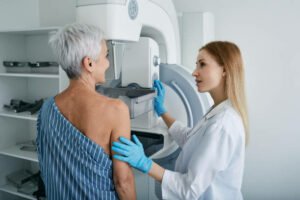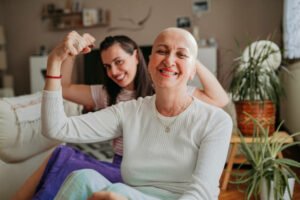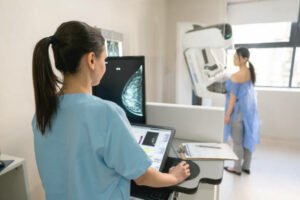Grants for Breast Cancer Patients 2024 | Find Financial Assistance Today.

Find grants for breast cancer patients to alleviate financial burdens. Explore funding options tailored to assist individuals undergoing breast cancer treatment. Access resources and support to ease your journey.
A breast cancer diagnosis often brings financial strain, encompassing medical expenses like tests and treatments, alongside ancillary costs such as childcare and transportation. Loss of income due to patients or caregivers being unable to work further compounds the financial burden. Various organizations in the U.S. offer aid, covering medical and non-medical expenses, tailored to individuals battling breast cancer.
Eligibility criteria vary per organization, typically concerning treatment status, income, and insurance coverage. Prior to applying for assistance, it’s advisable to review each organization’s specific requirements on their website.

Available Grants for Breast Cancer Patients
1. Susan G. Komen Financial Assistance Program
The Susan G. Komen Financial Assistance Program provides financial support to individuals facing financial hardships due to breast cancer. It offers assistance for expenses such as treatment, medication, transportation, and childcare. Eligibility criteria typically include income levels and breast cancer diagnosis. The program aims to alleviate the financial burden on patients and improve access to necessary care and support services. For specific details and application procedures, it’s best to visit the Susan G. Komen website or contact their helpline directly.
– Available for individuals undergoing treatment for breast cancer, including metastatic breast cancer.
– Offers assistance with daily living expenses like rent, utilities, childcare, elder care, oral treatment medicines, home healthcare, and medical equipment.
2. The Pink Fund
The Pink Fund is a non-profit organization dedicated to providing financial support to breast cancer patients during their treatment. It offers financial assistance for non-medical expenses such as housing, transportation, utilities, insurance premiums, and other basic living expenses. The organization helps alleviate the financial burden that often accompanies a breast cancer diagnosis, allowing patients to focus on their treatment and recovery without the stress of financial hardship.
To qualify for assistance from The Pink Fund, applicants must meet certain eligibility criteria, including a breast cancer diagnosis, active treatment, and demonstrated financial need. The organization evaluates each applicant’s situation on a case-by-case basis to determine the level of assistance they can provide.
In addition to financial assistance, The Pink Fund offers educational resources, advocacy, and support services to breast cancer patients and their families. These resources aim to empower patients with the information and support they need to navigate their cancer journey more effectively.
The Pink Fund plays a crucial role in supporting breast cancer patients by providing them with the financial assistance and resources they need to focus on their health and well-being during treatment.
– Provides a 90-day grant program covering living expenses for those in active breast cancer treatment.
3. Living Beyond Breast Cancer Fund
Living Beyond Breast Cancer (LBBC) is a national non-profit organization dedicated to providing support, education, and resources to individuals affected by breast cancer.
LBBC’s mission is to connect people with trusted breast cancer information and a community of support. They aim to help people impacted by breast cancer live as long as possible with the best quality of life. LBBC offers a variety of support services, including online and in-person support groups, webinars, conferences, and one-on-one mentoring programs. These programs provide emotional support, practical advice, and a sense of community for individuals at every stage of their breast cancer journey.
LBBC provides comprehensive educational resources on various aspects of breast cancer, including diagnosis, treatment options, side effects, survivorship, and living with metastatic breast cancer. These resources are available through their website, printed materials, and events.
LBBC advocates for policies and initiatives that benefit people affected by breast cancer, such as improved access to healthcare, increased funding for research, and better support services for survivors. They also work to raise awareness about breast cancer and promote early detection and prevention efforts.
LBBC supports research projects focused on improving outcomes and quality of life for individuals affected by breast cancer. They collaborate with researchers, healthcare providers, and other organizations to advance knowledge and innovation in breast cancer care. Living Beyond Breast Cancer plays a crucial role in supporting and empowering individuals affected by breast cancer by providing them with valuable resources, support services, and advocacy efforts.
– Offers need-based, one-time grants ranging from $500 to $1,250 for those in active treatment.
– Covers non-medical expenses such as mortgage, car payments, car insurance, and other utilities.
4. Expect Miracles Foundation’s SAMfund Grants
The SAMfund, a program of the Expect Miracles Foundation, provides financial support to young adult cancer survivors in the United States as they recover from the financial impact of cancer treatment.
SAMfund Grants aim to help young adult cancer survivors regain financial stability and move forward with their lives after experiencing the financial burden of cancer treatment. This support enables recipients to address various financial challenges, such as medical debt, student loans, health insurance premiums, rent, utilities, and other basic living expenses.
To be eligible for SAMfund Grants, applicants must be cancer survivors between the ages of 21 and 39, residing in the United States, and facing financial hardship as a result of their cancer diagnosis and treatment. They must demonstrate a need for financial assistance and provide relevant documentation to support their application.
SAMfund Grants provide financial assistance in various forms, including direct payments to creditors, reimbursement for eligible expenses, and scholarships for educational and vocational pursuits. The grants are flexible and tailored to meet the specific needs of each recipient, helping them overcome financial obstacles and pursue their goals.
Applicants for SAMfund Grants are required to complete an online application form and submit supporting documentation, such as medical records, treatment summaries, and financial statements. The applications are reviewed by the SAMfund team, and grants are awarded based on the individual’s financial need and the availability of funds.
Since its inception, the SAMfund has awarded grants to numerous young adult cancer survivors, providing them with crucial financial assistance and support during a challenging time in their lives. These grants have helped recipients alleviate financial stress, focus on their recovery and well-being, and move forward with confidence and resilience. SAMfund Grants offered by the Expect Miracles Foundation play a vital role in supporting young adult cancer survivors by providing them with much-needed financial assistance and helping them rebuild their lives after cancer treatment.
– Provides financial grants to young adults aged 21-39 with a history of breast cancer.
– Grants cover various expenses including car payments, graduate tuition, reconstructive procedures, fertility preservation, rent, or mortgage payments.

READ MORE: Academic Enrichment Grants – A Comprehensive Guide 2024.
5. Cancer and Careers
Cancer and Careers is a non-profit organization dedicated to empowering and educating individuals with cancer to thrive in the workplace. The mission of Cancer and Careers is to provide support, information, and resources to help people with cancer navigate their careers and employment during and after treatment. They aim to address the unique challenges and concerns that arise for individuals balancing cancer treatment and work responsibilities. Cancer and Careers offers a wide range of programs and services to support individuals with cancer in the workplace. These include:
Cancer and Careers provides comprehensive resources on topics such as disclosure, legal rights, managing side effects at work, career transitions, and more. The organization hosts webinars, workshops, and conferences featuring expert speakers and practical advice on navigating work and cancer.
Cancer and Careers offers free, personalized career coaching services to help individuals with cancer explore career options, develop job search strategies, and address workplace challenges. The Cancer and Careers website features an online community where individuals affected by cancer can connect with others, share experiences, and offer support. Cancer and Careers produces publications, toolkits, and guides to help individuals with cancer and their caregivers navigate employment-related issues.
Cancer and Careers organizes an annual National Conference on Work & Cancer, bringing together healthcare professionals, advocates, and individuals affected by cancer to discuss best practices, emerging trends, and practical strategies for managing work and cancer. In addition to supporting individuals with cancer, Cancer and Careers provides resources and training for employers to help them create supportive work environments for employees affected by cancer. This includes guidance on implementing flexible work arrangements, accommodating medical needs, and fostering a culture of support and inclusion.
Cancer and Careers has made a significant impact in the lives of individuals affected by cancer, helping them navigate employment challenges, maintain financial stability, and achieve their career goals while undergoing treatment and beyond. Cancer and Careers plays a vital role in empowering individuals with cancer to continue working, pursue their career aspirations, and thrive in the workplace despite the challenges posed by their diagnosis and treatment.
– Offers a one-time financial grant of $250 to cancer patients for living expenses.
– Covers utilities, bills, technology, training, or skill development.
6. United Breast Cancer Foundation’s Individual Grant Program
The United Breast Cancer Foundation (UBCF) Individual Grant Program provides financial assistance to individuals affected by breast cancer to help alleviate the financial burden associated with treatment, recovery, and related expenses. The program aims to support individuals diagnosed with breast cancer who are facing financial hardship by providing grants to cover various expenses, including but not limited to medical bills, co-pays, transportation costs, childcare, rent, mortgage payments, utilities, and other essential living expenses.
To qualify for the UBCF Individual Grant Program, applicants typically need to meet certain eligibility criteria, which may include being diagnosed with breast cancer, experiencing financial hardship as a result of their diagnosis and treatment, and meeting income guidelines. Each application is reviewed on a case-by-case basis.
Applicants are required to complete an application form provided by the UBCF and submit relevant documentation to support their request for financial assistance. Documentation may include medical records, proof of income, expense receipts, and other supporting documents as requested by the UBCF.
The UBCF Individual Grant Program provides financial assistance in the form of grants, which do not need to be repaid. The amount of assistance awarded varies depending on the individual’s financial need and available funds. The grants are intended to help cover specific expenses related to breast cancer treatment and recovery.
The UBCF Individual Grant Program has a significant impact on the lives of individuals affected by breast cancer, providing them with much-needed financial support during a challenging time. By alleviating the financial burden associated with breast cancer treatment and related expenses, the program enables recipients to focus on their health and well-being without worrying about financial hardship.
The UBCF Individual Grant Program plays a crucial role in supporting individuals affected by breast cancer by providing them with essential financial assistance and helping them maintain stability and dignity during their cancer journey.
– Supports individuals in treatment or remission for up to three years.
– Covers medical procedures, prescription medicines, COBRA insurance, housing expenses, utilities, transportation, and car insurance.
7. Patient Advocate Foundation (PAF)
The Patient Advocate Foundation (PAF) is a national non-profit organization that provides advocacy, education, and financial assistance to individuals facing healthcare challenges. The mission of the Patient Advocate Foundation is to provide effective mediation and arbitration services to patients to remove obstacles to healthcare access, maintenance, and affordability. They aim to empower patients to navigate the healthcare system, overcome barriers to care, and access the resources they need to achieve the best possible outcomes.
PAF offers advocacy services to help patients navigate complex healthcare systems, insurance issues, and financial challenges. They provide personalized assistance, guidance, and support to individuals facing barriers to care, including denied insurance claims, access to treatments, and medical debt.
PAF assigns case managers to work one-on-one with patients to assess their needs, develop personalized action plans, and connect them with resources and support services. Case managers advocate on behalf of patients to ensure they receive appropriate care and support.
One of PAF’s flagship programs is the Co-Pay Relief Program, which provides financial assistance to insured patients who are unable to afford their out-of-pocket medication costs. The program helps eligible patients access the medications they need to manage their health conditions without facing financial hardship. PAF offers educational resources, workshops, and webinars to empower patients with knowledge and information about their rights, healthcare options, and available resources. They also provide information about disease-specific programs and support services to help patients and caregivers navigate their healthcare journey.
PAF engages in policy advocacy at the state and federal levels to promote policies that improve access to healthcare, protect patients’ rights, and address systemic issues affecting healthcare affordability and accessibility.
The Patient Advocate Foundation plays a crucial role in supporting patients and caregivers by providing advocacy, education, and financial assistance to overcome barriers to healthcare access and affordability. Through their comprehensive services and programs, PAF helps patients navigate the complex healthcare landscape and access the care and support they need to lead healthier lives.
– Operates a co-pay relief program for insured individuals.
– Assists with coverage for medical prescriptions and treatments.
8. Infinite Strength
Infinite Strength is a non-profit organization dedicated to providing support, resources, and advocacy for individuals and families affected by pediatric cancer. Here are some key details about Infinite Strength: The mission of Infinite Strength is to support and empower children, adolescents, and young adults facing pediatric cancer, as well as their families, by providing emotional support, financial assistance, and access to resources and services.
Infinite Strength offers a variety of support services to individuals and families affected by pediatric cancer, including:
– Emotional Support: Infinite Strength provides emotional support through peer mentoring programs, support groups, counseling services, and community events to help individuals and families cope with the challenges of pediatric cancer.
– Financial Assistance: The organization offers financial assistance to help families cover medical expenses, travel costs, lodging, and other related expenses associated with pediatric cancer treatment.
– Educational Resources: Infinite Strength provides educational resources, workshops, and seminars to empower families with information about pediatric cancer, treatment options, coping strategies, and survivorship issues.
– Advocacy: The organization advocates for policies and initiatives that improve access to pediatric cancer treatment, research funding, and support services for affected individuals and families.
Infinite Strength engages with the community through outreach events, fundraising activities, and volunteer opportunities to raise awareness about pediatric cancer and support the needs of affected families.
Infinite Strength organizes various programs and events throughout the year to support individuals and families affected by pediatric cancer, including awareness campaigns, fundraising events, family retreats, and recreational activities for children undergoing treatment.
Infinite Strength collaborates with hospitals, healthcare providers, community organizations, and other stakeholders to enhance support services, expand access to resources, and improve outcomes for individuals and families affected by pediatric cancer. Infinite Strength plays a vital role in supporting and advocating for individuals and families affected by pediatric cancer by providing them with emotional support, financial assistance, educational resources, and access to community-based programs and services. Through its comprehensive approach, the organization aims to improve the quality of life and well-being of pediatric cancer patients and their families throughout their cancer journey.
– Provides grants to cover rent or mortgage for six months for solo parents with metastatic breast cancer.
9. Allyson Whitney Foundation
The Allyson Whitney Foundation is a non-profit organization dedicated to providing support, resources, and advocacy for young adults affected by rare cancers. The mission of the Allyson Whitney Foundation is to empower and support young adults (ages 16-40) with rare cancers by providing financial assistance, emotional support, and resources to help them navigate their cancer journey and improve their quality of life.
One of the primary services offered by the Allyson Whitney Foundation is financial assistance to help young adults with rare cancers cover medical expenses, treatment costs, transportation, lodging, and other related expenses. The foundation provides grants and scholarships to eligible individuals to alleviate the financial burden associated with their cancer diagnosis and treatment.
The Allyson Whitney Foundation offers emotional support through various programs and services, including peer mentoring, support groups, counseling services, and online communities. These resources provide young adults with rare cancers with a supportive network of peers who understand their unique challenges and can offer guidance, encouragement, and empathy. The foundation advocates for increased awareness and research funding for rare cancers affecting young adults. They work to raise awareness about the unique needs and challenges faced by this population, advocate for policies that improve access to care and support services, and collaborate with stakeholders to advance research and treatment options for rare cancers.
The Allyson Whitney Foundation engages with the community through outreach events, fundraising activities, and volunteer opportunities to raise awareness about rare cancers affecting young adults and support the needs of affected individuals and families. They also partner with hospitals, healthcare providers, advocacy organizations, and other stakeholders to enhance support services and resources for young adults with rare cancers.
The Allyson Whitney Foundation plays a crucial role in supporting and advocating for young adults affected by rare cancers by providing them with financial assistance, emotional support, and resources to help them navigate their cancer journey and improve their quality of life. Through its comprehensive approach, the foundation aims to empower young adults with rare cancers to overcome obstacles, access the care they need, and thrive beyond their diagnosis.
– Offers Life Interrupted Grants of $500 to $1,500 to young adults aged 16-36 diagnosed with breast cancer.
– Grants can be used for medical bills, rent, utilities, insurance premiums, IVF treatments, travel expenses, and integrative therapies.

Conclusion on Grants for Breast Cancer Patients
Grants for breast cancer patients play a vital role in providing financial assistance, support, and resources to individuals facing the challenges of breast cancer diagnosis and treatment. These grants help alleviate the financial burden associated with medical expenses, co-pays, transportation, housing, and other essential needs, allowing patients to focus on their health and well-being without worrying about financial hardship.
By offering financial assistance, grants for breast cancer patients help ensure access to quality care and treatment, regardless of one’s financial situation. They also provide emotional support, educational resources, and advocacy to empower patients and their families throughout their cancer journey.
While the eligibility criteria and application process may vary for each grant program, the overarching goal remains the same: to provide meaningful support and assistance to breast cancer patients in need. Through collaboration with non-profit organizations, government agencies, healthcare providers, and advocacy groups, grants for breast cancer patients contribute to improving the overall quality of life and outcomes for individuals affected by breast cancer.
The importance of grants for breast cancer patients remains paramount in ensuring that all individuals facing breast cancer receive the care, support, and resources they need to thrive.
Frequently Asked Questions
1. What types of grants are available for breast cancer patients?
– There are various types of grants available for breast cancer patients, including financial assistance grants to cover medical expenses, co-pays, transportation, childcare, housing, and other essential needs. Some grants may also support educational or vocational pursuits, such as scholarships or career development programs.
2. Who is eligible to apply for grants for breast cancer patients?
– Eligibility criteria for grants for breast cancer patients vary depending on the specific grant program. Generally, eligibility may be based on factors such as breast cancer diagnosis, financial need, residency, age, and other criteria set by the granting organization. Some grants may be open to individuals of all ages, while others may focus on specific demographics, such as young adults or low-income individuals.
3. How can I find grants for breast cancer patients?
– Grants for breast cancer patients may be available through various sources, including non-profit organizations, government agencies, hospitals, cancer centers, and advocacy groups. You can search online for grant opportunities, visit the websites of relevant organizations, and inquire with healthcare providers or social workers for assistance in finding grants.
4. What documents are required to apply for grants for breast cancer patients?
– The specific documents required to apply for grants for breast cancer patients may vary depending on the grant program. Commonly requested documents may include medical records, proof of breast cancer diagnosis, financial statements, tax returns, proof of residency, and other supporting documentation to verify eligibility and demonstrate financial need.
5. How do I apply for grants for breast cancer patients?
– To apply for grants for breast cancer patients, you typically need to complete an application form provided by the granting organization and submit it along with the required supporting documents. Some grant programs may have online application portals, while others may require paper applications. Be sure to carefully review the application instructions and deadlines for each grant program.
6. How long does it take to receive a response after applying for a grant for breast cancer patients?
– The timeline for receiving a response after applying for a grant for breast cancer patients can vary depending on the grant program and the volume of applications received. Some organizations may review applications on a rolling basis and provide a response within a few weeks, while others may have longer processing times. It’s important to follow up with the granting organization if you have not received a response within the specified timeframe.
7. Can I apply for multiple grants for breast cancer patients at the same time?
– Yes, you can typically apply for multiple grants for breast cancer patients at the same time, as long as you meet the eligibility criteria for each program. However, be sure to carefully review the requirements and restrictions of each grant program to avoid any conflicts or duplication of benefits. Keep in mind that receiving funding from one grant program may affect your eligibility for other programs, so it’s essential to coordinate your applications accordingly.



